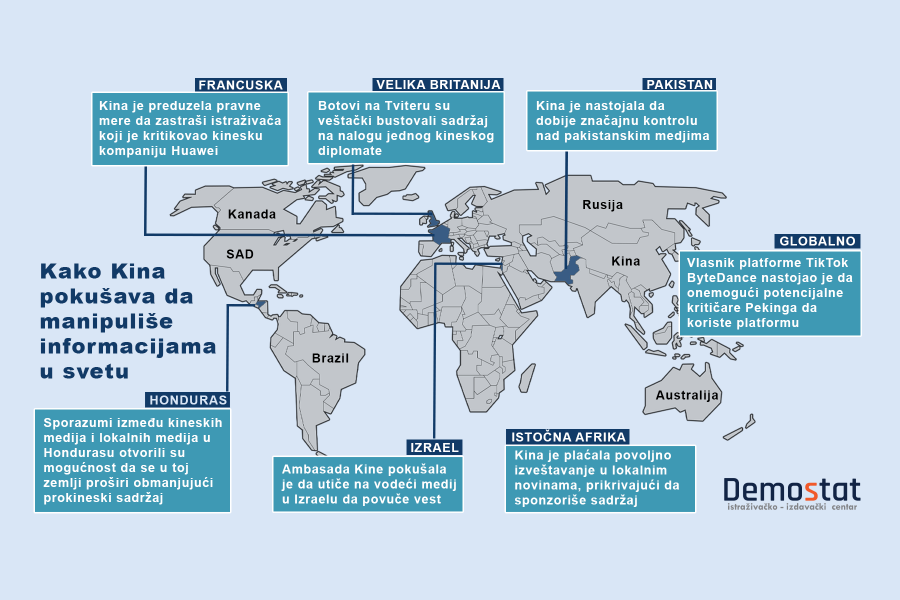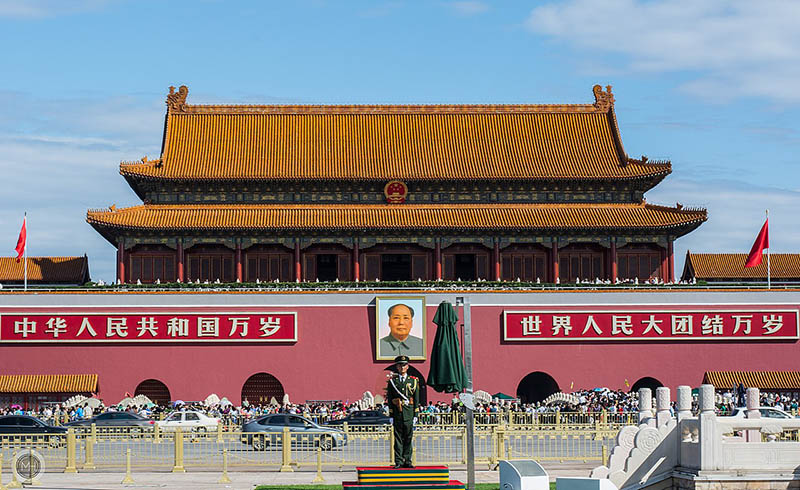Beijing is investing billions of dollars in building an information ecosystem with the goal of Chinas propaganda and disinformation gaining global traction and eventually becoming dominant. The approach of the Peoples Republic of China has five essential elements: using propaganda and censorship, promoting digital authoritarianism, using international organizations and bilateral partnerships, combining corruption and pressure, and controlling Chinese-language media. These five elements are mutually reinforcing and enable Beijing to control the narrative in the global information space by promoting false, misleading, or biased pro-China content and suppressing critical voices, according to a report by the US State Departments Center for Global Engagement.

Beijing is investing billions of dollars in building an information ecosystem with the goal of Chinas propaganda and disinformation gaining global traction and eventually becoming dominant. The approach of the Peoples Republic of China has five essential elements: using propaganda and censorship, promoting digital authoritarianism, using international organizations and bilateral partnerships, combining corruption and pressure, and controlling Chinese-language media. These five elements are mutually reinforcing and enable Beijing to control the narrative in the global information space by promoting false, misleading, or biased pro-China content and suppressing critical voices, according to a report by the US State Departments Center for Global Engagement.
China spends billions of dollars annually to manipulate information abroad, and it does so through propaganda, disinformation, and censorship.
Chinas efforts are enormous and, if left undetected and unchecked, could reshape the global information landscape and even lead individual nations to make decisions that subordinate their own economic and security interests to those of Beijing.
Beijing uses false, misleading, or biased information to promote positive views about China and the Chinese Communist Party.
At the same time, China suppresses critical voices that contradict its preferred narratives on issues such as Taiwan, human rights, the South China Sea, the domestic economy, or international economic engagement.
China encourages foreign governments, elites, journalists, and civil society to accept Chinas narratives and not criticize its moves internationally but also domestically.
Chinas approach to information manipulation includes propaganda and censorship, promotion of digital authoritarianism, exploitation of international organizations and bilateral partnerships, corruption and pressure, and control of Chinese-language media.
Beijing works diligently to maximize the reach of content on social media platforms in its favor, which is often biased, manipulative, or untrue.
In addition, China sponsors influencers on social networks and has open or hidden stakes in some foreign media.
Beijing also has, sometimes very restrictive, content-sharing agreements with specific local media outlets that can lead to trusted media giving legitimacy to unmarked or obscured Chinese content.
In addition, China has a policy of attracting prominent voices to its side, such as representatives of the political elite or journalists, who then always speak about China in superlatives without looking back at criticism.

Foto: Maximiliano Hebel, CC BY 3.0, via Wikimedia Commons
In addition to focusing on content creators, China has also targeted platforms for the global dissemination of information by investing in digital television services in Africa and satellite networks.
China often uses intimidation online or in real life to silence dissenters on sensitive issues and encourage self-censorship.
China is also taking action against certain corporations it deems to be challenging its preferred narratives on issues such as the situation in Xinjiang.
On the We-Chat app, which is used by many Chinese-speaking communities outside China, Beijing has implemented technical censorship and harassed individual content producers.
Data collected by Chinese corporations operating abroad has allowed Beijing to fine-tune global censorship by targeting specific individuals and organizations.
China promotes digital authoritarianism, which involves using digital infrastructure to suppress freedom of expression, censor independent news, promote disinformation, and deny other human rights.
By increasing surveillance and censorship technologies, often through capabilities bundled under the umbrella of "smart" or "secure cities," China has exported aspects of its domestic information environment to the world.

Foto: Stockvault
Beijing has also promoted information control tactics, focusing on Africa, Asia, and Latin America.
In parallel, China promoted authoritarian digital norms that other countries quickly adopted.
As other countries imitate China, their information ecosystems have become more receptive to Beijings propaganda, disinformation, and censorship.
Global manipulation of information is not only a matter of public diplomacy – but a challenge to the integrity of the international information space, according to the GEC report.
Unchecked, Beijings efforts could lead to a future in which the technology China exports, its influence on individual states, and the fear of direct retaliation reduce freedom of expression globally.
Beijing could then play a significant – and often hidden – role in determining the print and digital content audiences consume in developing countries.
China would use multilateral forums and certain bilateral relations to reinforce preferred narratives on issues such as Taiwan and the international economy.
Access to global data, combined with the latest advances in artificial intelligence technology, would allow China to target foreign audiences with surgical precision, potentially influencing economic and security decisions.
In this future scenario, information about China available to the public, media, civil society, academia, and governments could be distorted by propaganda and disinformation and limited by censorship.
This would present a direct challenge to all nations seeking to base their relations with China on fact-based assessments of their sovereign interests.
However, although backed by unprecedented resources, the Peoples Republic of Chinas propaganda and censorship have not produced the expected results everywhere.
When targeting democratic countries, Beijing faced significant obstacles, often due to opposition from local media and civil society.
France - China took legal action to intimidate a researcher who criticized Huawei
In September 2019, Huaweis French subsidiary filed a defamation lawsuit, which it eventually withdrew in July 2022, against a French researcher and host of a talk show on which she was a guest for saying the Chinese state and Communist Party controlled Huawei.
Great Britain - Bots on Twitter artificially boosted content on the account of a Chinese diplomat.
From June 2020 to January 2021, a network of dozens of accounts impersonating UK citizens generated 44 percent of the retweets of the then-Chinese ambassador to the UKs posts, 20 percent of the replies to his posts, and up to three-quarters of all engagements.
Honduras - Agreements between Chinese media and local media in Honduras have opened the door to the spread of misleading pro-China content in the country
Immediately after Beijing established formal diplomatic relations with Honduras, CMG and Xinhua opened local offices. They signed a cooperation agreement with Honduran state media, including content sharing and staff training.
Israel - The Chinese Embassy tried to influence a leading media outlet in Israel to retract the story.
In May 2022, after the Jerusalem Post published an interview with Taiwans foreign minister, the papers editor-in-chief tweeted that the Chinese embassy in Israel had contacted him directly and threatened to cut ties with Israel unless the paper retracted the interview, a threat that was not followed through on and materialized after the media refused to comply.
Pakistan - China has sought to gain significant control over Pakistani media.
In 2021, China attempted to negotiate significant control over Pakistani media as part of the China-Pakistan Media Corridor, including establishing a joint center to monitor and shape Pakistans information environment. It was an explicit example of Beijings ambition to take direct control over the domestic information environment of a close partner.
East Africa - China paid for favorable coverage in local newspapers, disguising itself as sponsoring content.
In the spring of 2021, Chinese government representatives in an East African country agreed with local newspapers to publish articles favorable to China. Representatives of the government and the media decided that the paid articles had no transparent direct connection with China. This type of agreement – in which information provided by Beijing is marketed by a trusted media outlet without attribution – distorts the local information environment and reduces the publics ability to make fact-based judgments.
World - The owner of the TikTok platform ByteDance has sought to prevent potential critics of Beijing from using the platform
TikToks owner, Chinese company ByteDance, is seeking to block potential critics of Beijing, possibly including those outside China, from using the platform. According to information from the US government, as of late 2020, the company maintained a regularly updated internal list identifying people likely to be blocked or restricted on all platforms, including TikTok, for advocating for Uyghur independence. This example illustrates how the spread of Chinas digital media globally creates new opportunities for Beijing to censor views that contradict its promoted narratives on issues such as Xinjiang.
North Macedonian Media Partner Link: https://www.slobodenpecat.mk/peking-troshi-milijardi-dolari-niz-svetot-za-shirenje-na-svoeto-vlijanie
In all societies there are issues that are rather being skipped. Certain...
The neoliberal path, started in 2001, has led to especially bad results in Serbi...
For centuries, the region was subsumed within the Ottoman and Hungarian Empires,...
"Serbia has returned to the systemic and anti-systemic position of the political...
In reality, Serbia is closer than ever to NATO. In the course of the last five y...